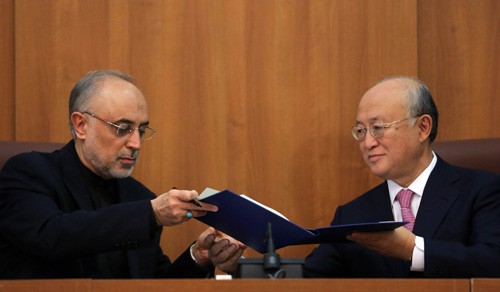|
 |
|
DEAL MAKERS: Head of Iran's Atomic Energy Organization Ali Akbar Salehi (left) and International Atomic Energy Agency Director General Yukiya Amano, sign a protocol on November 11 to resolve nuclear issues (XINHUA/AFP) |
After a long period of faltering Iranian nuclear talks, it appears there may be some hope for a peaceful resolution. However, no deal was reached until the last moment of the delayed Geneva talks on the issue from November 7 to 9 between Iran and the group known as the P5+1, which includes the five permanent members of the United Nations Security Council—China, the United States, Russia, France and Britain—plus Germany. Days after this round of talks, Iran and the IAEA announced an agreement that Iran will allow the UN nuclear watchdog to visit the Arak heavy water plant and Gachin uranium mine, which is seen as a sign of concession by Teheran to help resolve remaining disputes. Around the same time, London and Teheran announced plans to revive their diplomatic relations by once again appointing diplomats to each other, suggesting an apparent thaw in Iran's relations with the West.
Observers said the new round of talks in Geneva represents substantial progress in the Iranian nuclear issue. After a more than decade-long standoff over the controversial nuclear program, the world has finally come close to a historic turn.
U.S. Secretary of State John Kerry welcomed progress made during the talks. European Union foreign policy chief Catherine Ashton, who leads EU talks with Iran, said, "A lot of concrete progress has been achieved, but some differences remain."
Iranian Foreign Minister Javad Zarif offered another reason for optimism. "I think we are all on the same wavelength, and that's important," Zarif said. "That gives us the impetus to go forward."
"It is not easy to strike a deal, but the positive attitude and remarks from all parties showed that now is an extraordinary and historic opportunity," said Lu Jin, an associate research fellow with the Institute of West-Asian and African Studies under Chinese Academy of Social Sciences (CASS).
Unprecedented opportunity
Since the new (and comparatively moderate) Iranian President Hassan Rouhani took power on August 4, Iran's stance on its nuclear issue has displayed a certain level of flexibility.
Lu said both the United States and Iran revealed their willingness to seek a breakthrough on the Iranian nuclear issue following the latter's power transition.
"To grow its domestic economy, the new Iranian president hopes the international community will lift sanctions on the country in response to its softened stance toward nuclear talks," Lu said.
Li Shaoxian, a senior researcher on Middle East studies and Vice President of the China Institutes of Contemporary International Relations (CICIR), echoed Lu in saying that the U.S. sanctions on Iran has multiplied the country's economic difficulties. Iran's power transition could serve as an opportunity to make needed changes by easing its relations with the West and thereby improving the economy.
The U.S. President Barack Obama, a Nobel Peace laureate, also wants to make his mark on the deadlock, Lu added, noting that the relatively eased state of tensions between Washington and Teheran has contributed to the nuclear talk.
Observers noted that, after Obama took office for a second term, the U.S. diplomatic focus has moved slightly to the Middle East, even though its "pivot to Asia" strategy remains in place. American diplomat Kerry has paid extensive visits to the region after assuming the post as secretary of state.
During the UN Assembly this September, the first breakthrough was made in building mutual trust between the two countries. Obama and Rouhani held a talk by telephone during the Iranian president's New York trip, the first direct conversation between top leaders in Washington and Tehran since 1979, which was believed to have raised the possibility that a deal can be reached over Iran's controversial nuclear program.
Sadeq Zibakalam, a professor of politics at Tehran University, was quoted by Xinhua News Agency after the latest round of Geneva talks as saying that although there were some stumbling blocks in the process, "we have good grounds to be hopeful that a historic deal was in the air."
| 